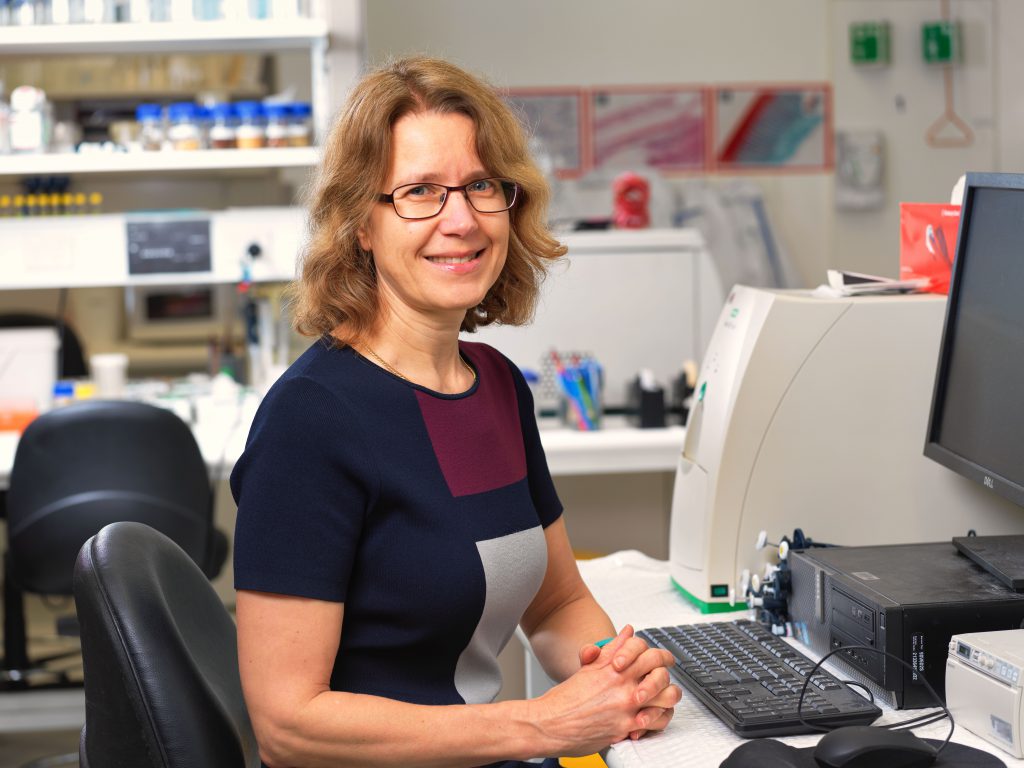Cancer research in Queensland has received a $4 million boost today, with Cancer Council Queensland announcing the recipients of its inaugural Accelerating Collaborative Cancer Research (ACCR) grants.
Two research teams at QIMR Berghofer Medical Research Institute will receive $500,000 per annum for four years, comprising $350,000 per annum from Cancer Council Queensland and a $150,000 per annum contribution from QIMR Berghofer.
Cancer Council Queensland CEO Ms Chris McMillan congratulated the successful recipients from QIMR Berghofer Medical Research Institute.
“Investment in innovative, ground-breaking research in Queensland is vital for reducing the burden of cancer in our community,” Ms McMillan said.
“We have implemented the Accelerating Collaborative Cancer Research grant scheme so that when researchers with the demonstrated ability for high-quality research come to us with innovative projects, we can fast-track their research as quickly as possible.
“The successful grant recipients from QIMR Berghofer, Professor Penelope Webb and Professor Nicola Waddell, are at the forefront of cancer research and their teams’ research provides hope for the 29,000 Queenslanders diagnosed with cancer each year.”
Professor Penelope Webb will lead a research project that will test the effectiveness and cost-effectiveness of the use of electronic patient-reported-outcome-measures in routine cancer care to improve patient outcomes, while Professor Nicola Waddell will lead a cross disciplinary team to improve understanding about the response or resistance of lung cancer to immunotherapy.
The ACCR grants have replaced Cancer Council Queensland’s long-running Cancer Research Project Grants. The new scheme will award two major new grants each year.
The application process is a two-stage process, involving initial expressions of interest followed by a full application by invitation. Eighteen high-quality expressions of interest were submitted by Queensland research teams for this round of funding.
“Our hope is that through encouraging effective research collaboration between universities, health services and scientific research institutions, the ACCR grants will accelerate the progress of research translation and improve the survival and well-being of cancer patients everywhere,” Ms McMillan explained.
Ms McMillan said the charity’s $2.8 million investment into this round of the ACCR grant scheme would not be possible without the generous support of the Queensland community.
“Every day, we’re working towards a cancer free future and thanks to our supporters, Queensland’s brightest cancer research minds are receiving the funding they need to help us get there sooner,” Ms McMillan said.
Cancer Council Queensland is an independent, community-based charity, the achievements of which are made possible by the generosity of Queenslanders.
For more information about Cancer Council Queensland and the ACCR grants, visit cancerqld.org.au/researchgrants.
ENDS
Media are invited to attend for photo, filming and interview opportunities:
Who: Cancer Council Queensland CEO Ms Chris McMillan, Cancer Council Queensland General Manager, Research, Professor Joanne Aitken, Grant recipient Professor Penelope Webb from QIMR Berghofer and Grant recipient Professor Nicola Waddell from QIMR Berghofer
When: Friday, November 15, at 9.30am (An event to celebrate the announcement will see attendees arrive from 9am for a 9.30am start)
Where: CCQ’s Brisbane Office, 553 Gregory Terrace, Fortitude Valley
Contact: CCQ Public Relations and Social Media Manager Lisa Maynard M. 0488 015 702
Accelerating Collaborative Cancer Research grant recipients
Lead Investigator: Professor Nicola Waddell
Administering Institution: QIMR Berghofer Medical Research Institute
Project Title: PROMISE: Patient-Reported Outcome Measures in cancer care: a hybrid effectiveness-Implementation trial to optimise Symptom control and health service Experience
Lay summary: In Queensland there were more than 280,000 cancer survivors in 2015; nationally the total is expected to reach 1.4 million by 2020. It is thus important we care for those affected in the most cost-effective way. Two recent trials found cancer patients who completed regular on-line questionnaires (electronic patient-reported-outcome-measures, e-PROMs) to tell their healthcare team how they were feeling, had better quality of life and significantly better survival than those receiving usual care. However, other studies have reported more modest benefits. As these systems are being introduced into clinical practice, it is important they are tested to ensure they are both effective and cost-effective in the Australian setting. We propose a randomised trial to test the effectiveness and cost-effectiveness of the use of ePROM tools in routine cancer care to improve patient outcomes. If the tools are effective, this would lead to improved quality of life for cancer patients and lower mortality rates. They would particularly benefit those in rural/remote areas who have to travel to major centres for follow-up. It will also support adaptation of the tools, co-designed with specific cultural populations to ensure relevance, further optimise access and ensure equality for all Queenslanders with cancer.

Professor Penelope Webb, QIMR Berghofer Medical Research Institute
Lead Investigator: Professor Nicola Waddell
Administering Institution: QIMR Berghofer Medical Research Institute
Project Title: LUCKI STARS: Lung cancer knowledge in immunogenomics to stratify therapeutic resistance and sensitivity
Lay summary: LUCKI STARS (Lung cancer knowledge in immunogenomics to stratify therapeutic resistance and sensitivity) is a new 11-member multi-disciplinary research network dedicated to developing diagnostic tools and therapeutic interventions to improve our understanding of lung cancer patient response or resistance to immunotherapy. Immunotherapy describes a collection of biological agents that boost the patient’s immune system to fight disease. These therapies work very well in some lung cancer patients, but not others. The team wants to know why this is and how to make this strategy effective for every patient. The team comprises cross disciplinary expertise including clinical care of lung cancer, and research experts in genomics, immunology and detection/prognostic biomarkers. Lung cancer is a major killer and key unmet clinical needs are to: 1) understand lung cancer patient response and resistance to current immunotherapy; 2) develop biomarkers of lung cancer response and resistance; and 3) treat lung cancer earlier with new combination immunotherapies. The team will interrogate the best available human lung cancer samples from clinical trial patients pre- and post-treatment. They will be using a variety of cutting-edge, integrated methodological approaches to evaluate the cancer cells and immune cells to improve patients’ response to therapies.

